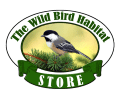Blog - General
Dave’s Bird Chatter December 2012
Dave’s December Bird Chatter
Let’s talk “wild bird feed”. The persistent drought combined with the competition of grains for food or fuel has impacted the cost of food for human consumption as well as wild bird feeds. Some folks may be asking why not just purchase the 50lb. bag at the local big box store and save money. Why not just buy the cheapest bag of black oil sunflower seed you can find?
The bottom line is quality. Take many low cost general wild bird blends. They contain filler seeds such as Milo, red millet, and wheat, products that song birds will not eat. Some labels on these bags may state “assorted grain products”. These are primarily weed seeds that are not desirable to our backyard birds. As much as 40% of that inexpensive 50lb. bag of wild bird feed ends up uneaten and wasting on the ground. White Proso millet is highly desired by many song birds. But with a failed white Proso millet crop in 2012, many wild bird feed packagers plan to add more filler seeds to cut their costs. This tactic will mean more waste in low cost wild bird feeds. At first glance those seeds look similar to white Proso millet but remember, all wild bird feed is required by law to list ingredients and in the order of content. So it is important to read the labels on bags of wild bird feed to see exactly what you are buying.
And that good deal you saw on black oil sunflower seed? Chances are it is of low grade and has been rejected by the food industry. You may be surprised that when cracked open the seeds in these low cost bags of black oil sunflower a majority of the hearts are under-developed, have been damaged from disease or partially consumed by insects. Quite often low grade black oil sunflower lacks sufficient cleaning to remove foreign debris. This debris adds to the overall weight of the bag which costs the consumer money. So in the long run sacrificing quality for a lower price actually costs more.
Nyjer thistle seed is another popular wild bird feed product. But thistle seed needs to be reasonably fresh for the finch to eat it. Nyjer thistle is imported from India and Ethiopia. When the product reaches North America it is sterilized by USDA regulations using a heat treatment. This sterilization process makes certain to avoid introducing non-native plants into North America. However a newly purchased bag of Nyjer thistle seed does not guarantee freshness. Many retailers get a reduced cost to purchase large quantities then warehouse the product for extended periods of time. It may be six months to a year or more before it is made available to the consumer. Songbirds will reject feeders containing old thistle seed which is the primary cause in failing to attract birds to a thistle feeder. Inquire about the freshness of the seed you purchase, or purchase from reputable suppliers.
Finch mixes can be another wild bird feed product that is misleading. Many finch mixes contain red millet, canary grass seed, flax, and other fillers. These seeds are ejected on the ground as the finch pick out what few Nyjer thistle seeds and fine sunflower chips are available in the mix. For 20 years the Wild Bird Habitat Stores have blended our own finch mix which is 50% Nyjer thistle seed and 50% fine sunflower chips providing the highest nutritional value for birds. This finch mix has recently become an industry standard offered by reputable wild bird feed manufacturers and retail outlets.
So you may be asking yourself, “What seeds and mixes are best to feed birds”. The “ideal diet” for many birds in the wild is high in fats and proteins…the opposite of ours as humans. Sunflower, safflower, Nutra- Saff Safflower, Nyjer thistle and peanuts range between 20-25% protein and 30-40% fat. That’s why these products make up a variety of Wild Bird Habitat’s high quality wild bird feed specialty mixes. Most “low cost” seed mixes only contain 8-12% protein and 2-4% fat. Our white Proso millet based general wild bird mixes contain no filler seeds which means 100% of it is eaten. And the black oil sunflower seed Wild Bird Habitat supplies our customers by the bag or in our mixes is of the highest food grade. Our black oil sunflower seed is triple screened to remove any foreign debris.
The wholesale cost of wild bird feed since it is traded on the commodities market changes on a monthly basis. Lately they seem to rise more than they fall. Wild Bird Habitat has reduced the return on wild bird feed sales to continue to offer our customers the highest quality wild bird feeds and mixes shipped directly from Des Moines Feed at an affordable price.
Wingtips: The cost of black oil sunflower seed has been inching down and we hope to lower our prices on 25lb. bags of black oil soon. Quality black oil sunflower seed is competed for by the wild bird feeding industry and the food industry. Black oil is crushed for cooking oil and has become the oil used in most all potato chips, along with snacks, and fast food. This means the final cost is always uncertain.
Some good news. After a lengthy drought in the southeastern U.S. peanuts hit record high costs. However this last year farmers planted more acres and had good spring rains that has led to a glut of peanuts. Hopefully we will see a decline in the cost of peanuts which are found in just about all our wild bird feed mixes.
The only thing left to be said if you deal in the quantities of wild bird feed that the Wild Bird Habitat Stores do on a weekly basis is pray for rain.
